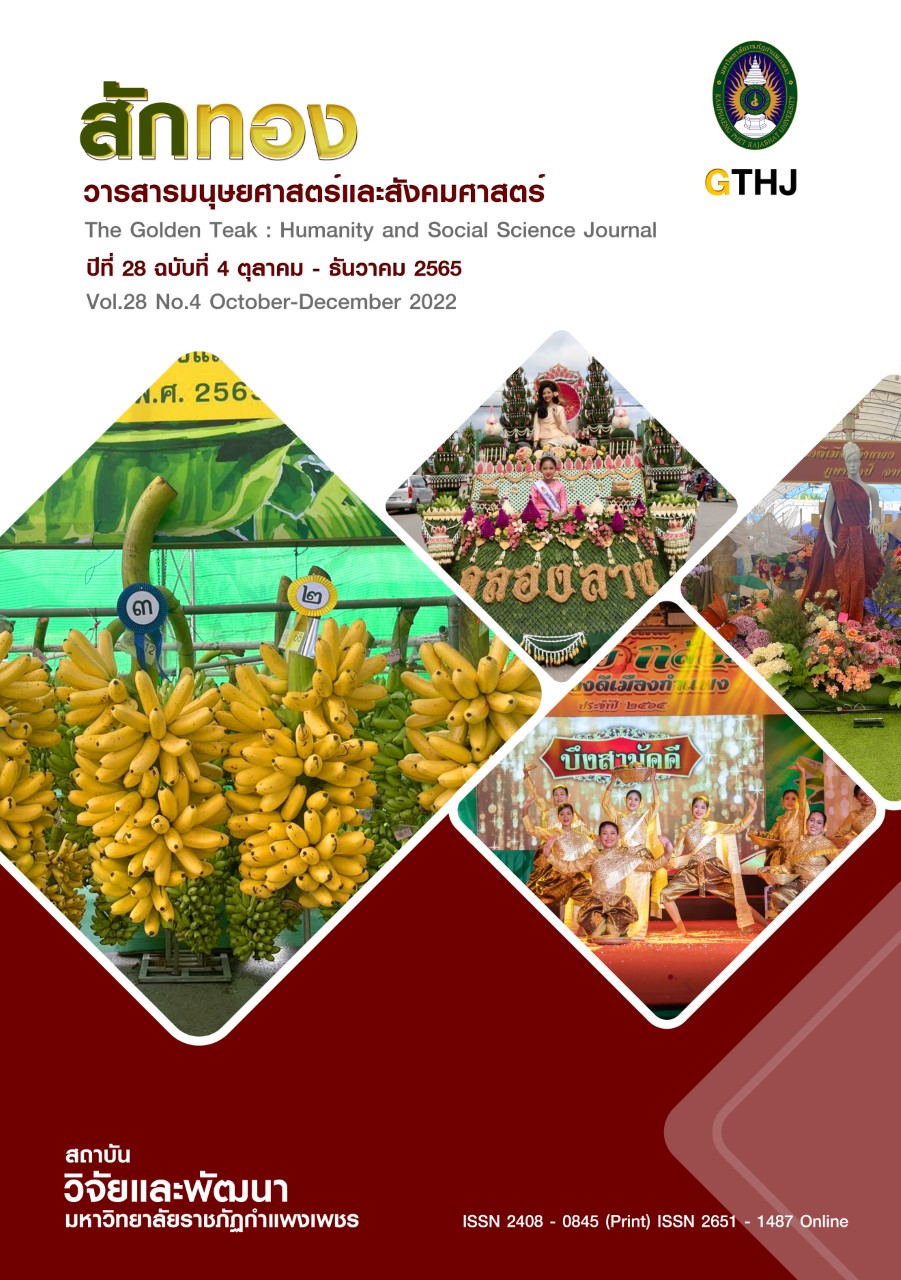Fables for Mindfulness : Techniques and Approaches in Fostering Mindfulness for Children
Main Article Content
Abstract
This research aims to study the literary techniques for conveying Dharma messages, and the approach to fostering Dharma messages in the Book Series 9+1 - Fables for Mindfulness published by Sathira Dharmsathan. The study reveals that three literary techniques are used to convey Dharma messages: firstly, the creation of narrative elements-creation of characters, the use of settings of nature and the title of each story; secondly, the creation of literary aesthetics-the use of language for children, metaphors, questions and answers, paradoxes, repetition and the creation of paralleled characters; thirdly, the creation of aesthetic components-pictures of stories and songs. These three literary techniques are used to convey Dharma messages that mindfulness protects the pure mind from passion and that mindfulness is the factor leading to a threefold method of training in morality, concentration and wisdom. A characteristic of this book series is the unity of each fable, while the whole series indicates the systematic approach in fostering Dharma for children in that parents and self-practice are factors, as well.
Article Details

This work is licensed under a Creative Commons Attribution-NonCommercial-NoDerivatives 4.0 International License.
บทความที่ได้รับการตีพิมพ์เป็นลิขสิทธิ์ของวารสาร สักทอง : วารสารมนุษยศาสตร์และสังคมศาสตร์ สถาบันวิจัยและพัฒนา มหาวิทยาลับราชภัฏกำแพงเพชร
ข้อคิดเห็นใดๆ ที่ปรากฎในวารสารเป็นวรรณกรรมของผู้เขียนโดยเฉพาะ ซึ่งมหาวิทยาลัยราชภัฏกำแพงเพชรและบรรณาธิการไม่จำเป็นต้องเห็นด้วย
References
Chongstitvattana, S. (2015). Scent of Sandalwood and the Sound of Moon-shaped Bell : Literary Language in Thai Literature. Bangkok : Dissemination of Research work project, Faculty of Arts Chulalongkorn University.
Mahavarakorn, S. & Supasetsiri, P. (2015). Win the Heart in Chokdee Tales Book Series : Life with Mangala is to Have a Lucky Life. Journal of Thai Studies, 11(1), 65-98.
Ngaorangsi, C. (2017). The Cartoon Tale of Vetala: A Teaching Tool for promoting Integrity and Morality. KKU International Journal of Humanities and Social Sciences, 7(2), 1-18.
Palitpholkarnphim, P. (2019). Attachment is a rudder and Executive Functions is a bow. [Online]. Available : https://www.facebook.com/prasertpp/posts/844350139246815/
, May 31].
Panwang, W. (2019). The Learning Management Using Moral Folktales to Promote Good Citizenship of Earl Childhood. Journal of Graduate MCU KhonKaen Campus, 6(2), 253-270.
Phra Brahmagunabhorn. [P.A. Payutto]. (2009). Buddha dharma revised and extended edition. Bangkok : Mahachulalongkorn Raja Vidyalaya University.
Pinprateep, R. (2018). As Flowers Bloom. Bangkok : Plan for Kids.
Pinprateep, R. (2018). Blink! Blink! Gone!. Bangkok : Plan for Kids.
Pinprateep, R. (2018). Extending Loving-kindness. Bangkok : Plan for Kids.
Pinprateep, R. (2018). Growing Life. Bangkok : Plan for Kids.
Pinprateep, R. (2018). Happiness of My Heart. Bangkok : Plan for Kids.
Pinprateep, R. (2018). Hello, Good-Bye. Bangkok : Plan for Kids.
Pinprateep, R. (2018). Lullaby. Bangkok : Plan for Kids.
Pinprateep, R. (2018). Picking Stars. Bangkok : Plan for Kids.
Pinprateep, R. (2018). Sensing not Reacting… Stay Calm Stay Clam. Bangkok : Plan for Kids.
Pinprateep, R. (2018). The King in Fairy Tales. Bangkok: Plan for Kids.
Pongpangpa, S. (2001). Effects of teaching the story of Mahajanaka by using project approach on perseverance of kindergarteners. Master’s thesis, Chulalongkorn University.
Saengpaeng, S. & Lehmongkol, P. (2020). The Effects of Storytelling with Role Play Activity Provision to Promote Citizenship in Young Children. Journal of Chandrakasemsarn, 26(1), 117-130.
Somdet Phra Buddhaghosachaya. [P.A. Payutto]. (2018). Dictionary of Buddhism. [Online]. Available : https://www.watnyanaves.net/th/book_detail/268 [2021, June 20].
Songphao, T. (2020). Visiting Garden and Listening Dharma at Sathira Dharmasathan. [Online]. Available : https://www.baanlaesuan.com/109372/gardens/buddhist-temple [2021, May 30].
Wannakit, N. (2016). Literature for Children. Nonthaburi : Inthanin.
Wasiwiwat, P. (2016). Jataka Tales for Teaching Children Morals: Creation and Function in Today’s Thai Society. Journal of Humanities and Social Sciences, 12(2), 111-150.


